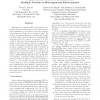Free Online Productivity Tools
i2Speak
i2Symbol
i2OCR
iTex2Img
iWeb2Print
iWeb2Shot
i2Type
iPdf2Split
iPdf2Merge
i2Bopomofo
i2Arabic
i2Style
i2Image
i2PDF
iLatex2Rtf
Sci2ools
IPPS
2002
IEEE
2002
IEEE
Static Mapping Heuristics for Tasks with Dependencies, Priorities, Deadlines, and Multiple Versions in Heterogeneous Environment
Heterogeneous computing (HC) environments composed of interconnected machines with varied computational capabilities are well suited to meet the computational demands of large, diverse groups of tasks. The problem of mapping (defined as matching and scheduling) these tasks onto the machines of a distributed HC environment has been shown, in general, to be NPcomplete. Therefore, the development of heuristic techniques to find near-optimal solutions is required. In the HC environment investigated, tasks had deadlines, priorities, multiple versions, and may be composed of communicating subtasks. The best static (off-line) techniques from some previous studies were adapted and applied to this mapping problem: a genetic algorithm (GA), a GENITOR-style algorithm, and a greedy Minmin technique. Simulation studies compared the performance of these heuristics in several overloaded scenarios, i.e., not all tasks executed. The performance measure used was a sum of weighted priorities of tasks...
Distributed And Parallel Computing | Greedy Minmin Technique | HC Environment | IPPS 2002 | Varied Computational Capabilities |
| Added | 15 Jul 2010 |
| Updated | 15 Jul 2010 |
| Type | Conference |
| Year | 2002 |
| Where | IPPS |
| Authors | Tracy D. Braun, Howard Jay Siegel, Anthony A. Maciejewski |
Comments (0)

